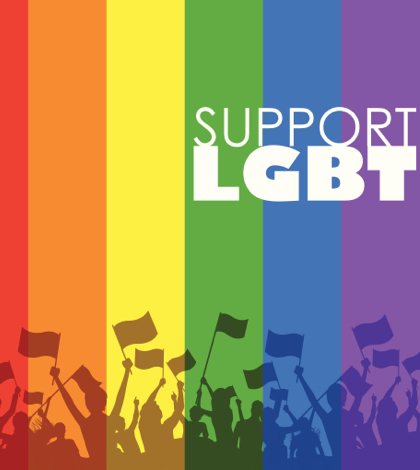Stonewall Gardens in Palm Springs, scheduled to open this summer, will cater to LGBT residents. Despite the Coachella Valley’s large gay population, it will be the first facility of its kind in the region.
What is being called the Coachella Valley’s first assisted-living facility for elderly LGBT residents is scheduled to open this summer in Palm Springs.
The 24-unit Stonewall Gardens is under construction at 2150 N. Palm Canyon Road, said Steve Kregel, chief operating officer with Northstar Senior Living in Redding, the company that will manage the project.
Work on the former 1950s-era resort began in March and is expected to be finished in late July, when the first apartment model is expected to be ready for public inspection. Stonewall Gardens will offer a full-time licensed nurse, a 24-hour professional staff and various amenities, including outdoor dining and entertainment and a full slate of recreational and social activities.
Because Palm Springs has such a large gay and lesbian population – 50 percent of the town’s residents, or slightly higher, according to some estimates – the city was the logical place to establish the desert’s first care facility that will be primarily for gay and lesbian seniors, Kregel said.
“It’s going to be a nice, high-end care facility” Kregel said of Stonewall Gardens, named after the 1969 Stonewall riots in New York that are considered the start of the gay rights movement in the United States. “It will cater to the gay and lesbian community, but it will be open to anyone who wants to live there.”
The project began when two Los Angeles investors approached Northstar Senior Living about restoring a bungalow-style resort they owned on North Palm Canyon Road into a senior care facility.
Kregel suggested making it an LGBT-friendly home, something he believes is badly needed in the desert community. He pointed out that Northstar Senior has developed multiple senior care operations in the Coachella Valley, each of which usually attracts a few gay and lesbian patrons.
“Most of them are quiet about the lifestyle,” Kregel said. “They don’t make a big deal out of it, but it’s obvious the market is there.”
The investors liked the idea immediately and began making plans.
“I’ve spent a lot of time in Palm Springs, so I’m familiar with the population,” Kregel said. “I know there’s a need for something like this, and it will succeed if it has the right amenities. It’s a good location, and it helps that it’s a smaller building.”
Someday, when such care facilities for gay and lesbian seniors are commonplace, Stonewall Gardens might be considered historic: it was the first time in the Coachella Valley that a developer recognized there was a market for assisted living centers geared specifically to the gay and lesbian market.
For now, there are only a handful of facilities in the United State that fit that description, and no data on how many are being planned, according to several gay and lesbian support organizations.
The website www.gayretirementguide.com lists 23 gay and lesbian-oriented retirement facilities in 10 states: Arizona, California, Delaware, Florida, North Carolina, Massachusetts, Minnesota, New Mexico, Oregon and Texas.
“There aren’t that many of them, and I hear some of them aren’t doing well.” Kregel said of gay-friendly retirement communities, which in appearance and amenities aren’t any different from communities built for the straight community. “We’re in 28 markets and this is the first one we’ve done anywhere.”
Almost certainly it won’t be the last. Like the general population, the gay and lesbian community is aging: there are an estimated 1.5 million LGBT adults 65 year old or older in the United States, and that number is expected to double by 2030, according to the National Resource Center on LGBT Aging, a non-profit organization in New York.
Like everyone else, those in the aging gay and lesbian population want to retire comfortably and spend their final years in place they can afford. For several reasons, they’re more likely to move to retirement communities than are members of the straight community.
Gay and lesbian people spend much of their adult lives dealing with housing discrimination, and that doesn’t necessarily go away as they get older. More than one-quarter of all LGBT Baby Boomers say they have great concerns about housing discrimination as they get older, according to a recent study by the MetLife Mature Market Institute, a research entity of Metropolitan Life Insurance Co.
Even the U.S. Fair Housing Act of 1968 isn’t much help. It prohibits discrimination in most private and public housing based on race, color, national origin or gender, but it doesn’t mention sexual orientation, which leaves the door open for discrimination against gays and lesbians.
Most members of the LGBT community will be attracted to a care facility, especially one designed to care for them specifically, rather than having to deal with more discrimination late in life.
Also, members of the LGBT community usually don’t have children and are often alienated from their families, so there’s no one to take care of them as they get older and their care needs multiply.
“The older you get in the gay and lesbian population the greater the need for this kind of facility,” said Mary Thorndal, executive director of the Los Angeles-based Gay & Lesbian Association of Retired Persons Inc. “I’m glad (Stonewall Gardens) is being built, because we need choices. In Palm Springs, with the gay and lesbian population they have there, a facility like that will be gobbled up.”
The growing support among the U.S. population for equal rights for gays and lesbians – a Gallup Poll conducted in May found that 55 percent of U.S. residents believe same-sex couples should be allowed to marry – will make it easier to market LGBT-oriented senior-care facilities, said Catherine Thurston, senior director of programs for SAGE, a gay and lesbian advocacy group in New York.
“The gay population is getting older, and (gay people) should have a places where they can spend their final years in comfort, especially if they’ve already come out,” Thurston said. “The demand for these kinds of facilities is only going to grow.”
 IE Business Daily Business news for the Inland Empire.
IE Business Daily Business news for the Inland Empire.


